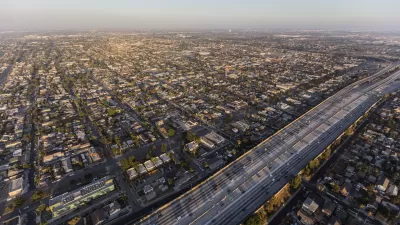A "white supremacist" law that blocks public housing in the state is up for repeal—again.

California leaders hope that in 2020, voters will agree to remove a barrier to public housing construction that has been enshrined in state law for 70 years.
That barrier is Article 34 of the California Constitution, which triggers a popular vote before public housing is built—a requirement unique to California. In a feature for the Los Angeles Times, Liam Dillon details how the amendment has not only diminished California's supply of affordable housing over the decades, but also hindered desegregation efforts throughout the state; shaped policy and finance around housing development; and led to a U.S. Supreme Court ruling that government could legally discriminate against poor people.
State Senator Ben Allen and Los Angeles Mayor Garcetti are among the leaders now pushing to abandon Article 34—calling the rule "anachronistic" and "white supremacist," respectively. If the measure appears on the ballot, it would mark the fourth time voters have been asked to repeal the law since it was first approved in 1950.
So far, it's never come close. But lawmakers hope that 2020 will be different. The last few years have seen voters support multiple tax increases and bond measures to fund affordable housing—and become increasingly likely to say yes to housing subject to their approval.
FULL STORY: A dark side to the California dream: How the state Constitution makes affordable housing hard to build

Planetizen Federal Action Tracker
A weekly monitor of how Trump’s orders and actions are impacting planners and planning in America.

San Francisco's School District Spent $105M To Build Affordable Housing for Teachers — And That's Just the Beginning
SFUSD joins a growing list of school districts using their land holdings to address housing affordability challenges faced by their own employees.

The Tiny, Adorable $7,000 Car Turning Japan Onto EVs
The single seat Mibot charges from a regular plug as quickly as an iPad, and is about half the price of an average EV.

Seattle's Plan for Adopting Driverless Cars
Equity, safety, accessibility and affordability are front of mind as the city prepares for robotaxis and other autonomous vehicles.

As Trump Phases Out FEMA, Is It Time to Flee the Floodplains?
With less federal funding available for disaster relief efforts, the need to relocate at-risk communities is more urgent than ever.

With Protected Lanes, 460% More People Commute by Bike
For those needing more ammo, more data proving what we already knew is here.
Urban Design for Planners 1: Software Tools
This six-course series explores essential urban design concepts using open source software and equips planners with the tools they need to participate fully in the urban design process.
Planning for Universal Design
Learn the tools for implementing Universal Design in planning regulations.
Smith Gee Studio
City of Charlotte
City of Camden Redevelopment Agency
City of Astoria
Transportation Research & Education Center (TREC) at Portland State University
US High Speed Rail Association
City of Camden Redevelopment Agency
Municipality of Princeton (NJ)





























